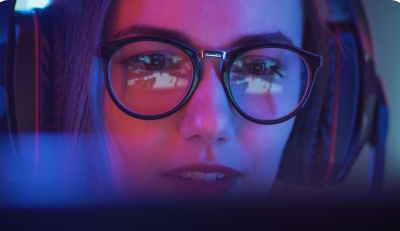The Daily Regimen of Players in Professional Gaming
Video games are faster and more immersive than ever, which makes it easy to fantasize about the life of a pro gamer. So, how do esports players — and by extension esports teams — maintain a daily regimen that supports them to keep playing the games at which they excel? To answer these questions, we spoke to pro players of Overwatch*, Counter-Strike*: Global Offensive* (CS:GO), and League of Legends*.
Two pro gamers interviewed for this story — Lynnie “artStar” Noquez of Counter-Strike*: Global Offensive organization Team Dignitas* and League of Legends* team Clutch Gaming Academy’s* Cody Sun — both describe a daily regimen of about six to eight hours of structured team practice, which is always complemented by several more hours of self-directed practice. Noquez summed up a typical daily schedule:
I wake up around 11:00 AM and reply to all my work emails. Then I get ready around 12-1 PM, cook lunch with my fiancé, or sometimes go out to eat with his family. My afternoons are spent doing whatever I need to get done that day, whether it’s running errands, cleaning the house, prepping dinner, or if I’m lucky and did all that a different day, I usually spend time with family and friends. I do all of this until around 5:00 PM, and that’s when I start individual Counter-Strike* practice. I’ll watch a demo, review my nades, play some pugs or stream on Twitch*. Around 7:00 PM team practice with Dignitas* begins. We take a short break in the middle of practice for a dinner then end practice around 11:00 PM. Right after practice, I usually head straight to bed and repeat the next day for 5 days a week!
While other players might have team practice during the day instead of the evening, their routines were otherwise similar — finding large blocks of time to get as much gameplay time in as possible, then fitting in errands and other life events when they can.
Practice, Practice, Practice
What does all this practice time actually look like? Though esports pros’ training regimens might differ as much as their preferences in peripherals, there are some common practices shared between them.
For a well-established esport title like League of Legends*, practice time is essentially playing the same game that regular gamers play, over and over (and over) again.
While League of Legends* developer Riot Games* added an oft-requested practice mode to the game in 2017, Clutch Gaming Academy’s* Cody Sun says that top-tier players already have to be so good at all of the game’s different nitty-gritty mechanics like last-hitting (killing enemy minions at the right moment to maximize gold and XP intake) or flashing (teleporting short distances) that they don’t really run drills. Instead, they constantly scrimmage, or “scrim,” usually against each other or the other professional teams — the same ones they compete against in tournaments throughout each season. These games are all recorded and studiously pored over by the players, managers and coaches, looking for any areas of improvement or instances where team synergy is lagging.
Stay Active in the Real World
Esports players often stress the importance of physical exercise as part of their health regimen. For some, like Overwatch League’s* Eli “Elk” Gallagher, a fitness routine was something they’d only discovered in order to complement their training behind the keyboard.
Get Plenty of Rest and Relaxation
Cody Sun strives to maintain a proper sleep schedule, social life, and healthy mindset, rather than grinding out as many games as possible every single day.
“I do think that the most, or the best players in our industry are the ones that are able to find the best schedule for themselves, and, you know, be as efficient as they can with their lifestyle — practicing as well as exercising and eating well and having a decent social life as well,” he says.
Sun believes that the culture of esports has improved significantly — even just over the past two or three years — by embracing a more holistic approach to practicing and gaming. “It’s really hard for us to only have six hours of sleep and practice constantly. I feel like our current approach, or at least the direction of our approach, is making sure we have a healthy lifestyle, and healthy mindset, and then just be really efficient with the practice.”


